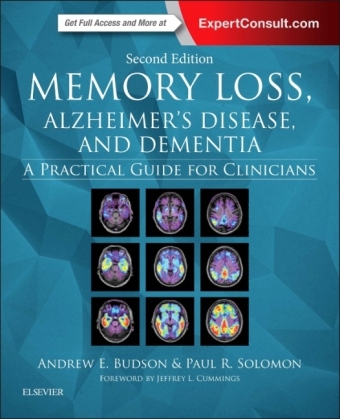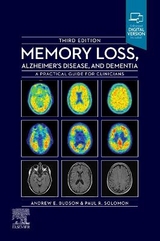
Memory Loss, Alzheimer's Disease, and Dementia
Elsevier - Health Sciences Division (Verlag)
978-0-323-28661-9 (ISBN)
- Titel erscheint in neuer Auflage
- Artikel merken
Key Features:
- Access the fully searchable text online at expertconsult.com, along with a downloadable image bank.
- Confidently diagnose and treat Alzheimer’s disease and other common dementias through in-depth coverage of clinically useful diagnostic tests and the latest treatment approaches.
- Tap into the expertise of key leaders in the field for clear and practical guidance.
- See how to evaluate and manage both common and uncommon conditions with a full range of detailed case studies.
- Confirm your diagnoses easily with diagnostic tests.
- Carry the book with you and consult it conveniently thanks to its compact, portable format.
New to This Edition:
- Comprehensive coverage of hot topics such as chronic traumatic encephalopathy, in addition to new criteria on vascular dementia and vascular cognitive impairment.
- Includes new National Institute on Aging-Alzheimer's Association and DSM-5 criteria for Alzheimer’s Disease and Mild Cognitive Impairment.
- Learn how to use new diagnostic tests, such as the amyloid imaging scans florbetapir (Amyvid), flutemetamol (Vizamyl), and florbetaben (Neuraceq), which can display amyloid plaques in the living brains of patients.
- Updated case studies, many complete with videos illustrating common tests, clinical signs, and diagnostic features, are now incorporated into the main text as clinical vignettes for all major disorders.
- Brand-new chapters on how to approach the differential diagnosis and on primary progressive aphasia.
- Expert Consult eBook version included with purchase. This enhanced eBook experience allows you to search all of the text, figures, references, and videos from the book on a variety of devices.
Andrew E. Budson, MD, Neurology Service, Section of Cognitive & Behavioral Neurology, Veterans Affairs Boston Healthcare System, Boston, MA; Alzheimer’s Disease Center & Department of Neurology, Boston University School of Medicine, Boston, MA; Harvard Medical School, Boston, MA; The Boston Center for Memory, Newton, MA; The Memory Clinic, Bennington, VT
Paul R. Solomon, PhD, Department of Psychology, Program in Neuroscience, Williams College, Williamstown, MA; The Boston Center for Memory, Newton, MA; The Memory Clinic, Bennington, VT
SECTION I: EVALUATING THE PATIENT WITH MEMORY LOSS
1. Why Diagnose and Treat Memory Loss, Alzheimer’s Disease, and Dementia?
2. Evaluating the Patient with Memory Loss or Dementia
SECTION II: DIFFERENTIAL DIAGNOSIS OF MEMORY LOSS
3. Approach to the Patient with Memory Loss, Mild Cognitive Impairment, or Dementia
4. Alzheimer’s Disease and Mild Cognitive Impairment due to Alzheimer’s Disease
5. Dementia with Lewy Bodies (Including Parkinson’s Disease Dementia)
6. Vascular Dementia and Vascular Cognitive Impairment
7. Primary Progressive Aphasia & Other Disorders of Speech
8. Frontotemporal Dementia
9. Progressive Supranuclear Palsy
10. Corticobasal Degeneration
11. Normal Pressure Hydrocephalus
12. Jakob-Creutzfeldt Disease
13. Chronic Traumatic Encephalopathy
14. Other Disorders That Disrupt Memory
SECTION III: TREATMENT OF MEMORY LOSS
15. Goals of Treatment of Memory Loss, Alzheimer’s Disease, and Dementia
16. Cholinesterase Inhibitors
17. Memantine (Generic and Namenda XR)
18. Vitamins, Herbs, Supplements, and Anti-Inflammatories
19. Future Treatments of Memory Loss
20. Non-Pharmacological Treatment of Memory Loss
SECTION IV: BEHAVIORAL AND PSYCHOLOGICAL SYMPTOMS OF DEMENTIA
21. Evaluating the Behavioral and Psychological Symptoms of Dementia
22. Caring For and Educating the Caregiver
23. Non-Pharmacological Treatment of the Behavioral and Psychological Symptoms of Dementia
24. Pharmacological Treatment of the Behavioral and Psychological Symptoms of Dementia
SECTION V: ADDITIONAL ISSUES
25. Life Adjustments
26. Legal and Financial Issues
27. Special Issues
ONLINE ONLY APPENDICES
APPENDIX A: Cognitive Test and Questionnaire Forms, Instructions, and Normative Data
APPENDIX B: Screening for Memory Loss
APPENDIX C: Our Current Understanding of Memory
The cohesive text is an appealing blend of personal experience and clinical anecdotes, and is supported by a firm command of the rapidly changing clinical literature. The writing is crisp, lucid and, above all, practice-oriented … Budson and Solomon are especially adroit in identification of controversies, knowledge gaps, and areas in which diagnostic criteria are ill-defined or difficult to apply (eg, fluctuating cognition in dementia with Lewy bodies). Readers are not abandoned without guidance; ambiguities are resolved by confident descriptions of personal approaches to specific situations … The book is an incredible compilation of practical advice. (Lancet Neurology, March 2012)
"The book covers the daunting subject of the evaluation, differential diagnosis, and treatment of patients with dementing illnesses. All chapters start with a point-by-point summary of the content, rapidly orienting readers.Both authors are authorities in the area of neurodegenerative dementias. This is a very good addition to the books on dementias. It is written in a clear style. It will be very useful to readers who are students or generalists, but neurological or neuropsychiatric specialist may want more detail than this book provides." - Eric Gausche, MD(University of Illinois at Chicago College of Medicine), Doody’s review service, rating - 4 Stars!
"This book summarizes complex material in a manner that benefits clinical practitioners at all levels. This is an excellent addition to the library of professionals serving older adults." - Maureen K. O’Connor, (Psy.D., ABCN, Chief, Neuropsychology Service, Edith Nourse Rogers Memorial Veterans Hospital, Bedford, MA)
"Designed for easy reference to satisfy the real time needs of clinicians in hectic clinical settings, I’m sure this volume will be dog-eared in short order given its clear no-nonsense style." - Neil W. Kowall, M.D. (Professor of Neurology and Pathology, Boston University School of Medicine, Director, Boston University Alzheimer’s Disease Center,Chief, Neurology Service, Boston VA Healthcare System)
"Memory Loss: A Practical Guide for Clinicians provides the assessment, diagnostic and therapeutic insights clinicians need to provide exemplary care to memory impaired patients. Don’t go to the clinic without it." - Jeffrey L. Cummings, M.D. (Director, Cleveland Clinic Lou Ruvo Center for Brain Health, The Andrea L. and Joseph F. Hahn MD Chair of Neurotherapeutics)
"Few books provide both a comprehensive review and a step-by-step guide. I strongly recommend this book to all those who treat patients with memory loss-physicians, social workers, psychologists, nurses-at every level of training and experience." - P. Murali Doraiswamy, M.D.(Professor & Head, Division of Biological Psychiatry, Duke University, and co-author of The Alzheimer’s Action Plan)
"From the point of view of the busy clinician working in the trenches but looking for a practical and cutting-edge guide, Doraiswamy said he cannot think of a better book, noting, ‘This is the clinical book of the year in our field.’" (Alzheimer's Research Forum review, December 2011)
| Erscheint lt. Verlag | 24.7.2015 |
|---|---|
| Zusatzinfo | Approx. 320 illustrations (320 in full color) |
| Verlagsort | Philadelphia |
| Sprache | englisch |
| Maße | 191 x 235 mm |
| Gewicht | 628 g |
| Themenwelt | Medizin / Pharmazie ► Medizinische Fachgebiete ► Geriatrie |
| Medizin / Pharmazie ► Medizinische Fachgebiete ► Neurologie | |
| Schlagworte | Alzheimer • Alzheimer' s disease • Alzheimer Demenz • Amnesie • Demenz, Alzheimer • Gedächtnisverlust |
| ISBN-10 | 0-323-28661-5 / 0323286615 |
| ISBN-13 | 978-0-323-28661-9 / 9780323286619 |
| Zustand | Neuware |
| Haben Sie eine Frage zum Produkt? |
aus dem Bereich



